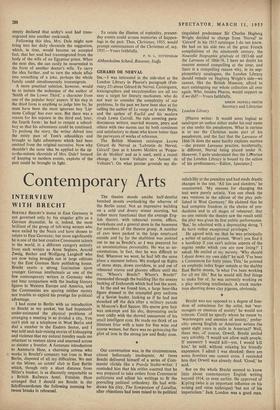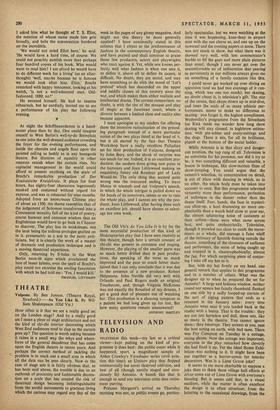Contemporary Arts
INTERVIEW WITH BRECHT
BERTOLT BRECHT'S status in East Germany is not governed only by his singular gifts as a German dramatist; he is, indeed, the most brilliant of the group of left-wing writers who were exiled by the Nazis and have chosen to return to East Germany; but more significantly he is one of the best creative Communist talents in the world, in a different category entirely from such writers as Anna Seghers, Arnold Zweig, Becher and Wolfgang Langhoff who are now being brought out in large editions by the East German State publish;ng house. Brecht exerts a strong fascination upon younger German intellectuals as one of the few contemporary writers in Germany who can bear comparison with the leading literary figures in Western Europe and America, and the Communists are sparing neither money nor trouble to exploit his prestige for political advantage.
I had come to Berlin with an introduction to Brecht in my pocket', but had hopelessly under-estimated the physical problems of arranging a meeting in so divided a city. You can't pick up a telephone in West Berlin and dial a number in the Eastern Sector, and I was told such hair-raising stories of kidnapping and violence that my natural timidity made me reluctant to venture alone and unarmed across so sinister a frontier. A fortunate introduction to Annmarie Hase, a charming actress who works in Brecht's company but lives in West Berlin, disposed of all my difficulties. We met at the Mowe, an actors' club in East Berlin which, though only a short distance from Hitler's bunker, is as discreetly respectable as a British Railways hotel. Fraulein Hase arranged that I should see Brecht in the Schiffbauerdamm the following morning be- tween breaks in rehearsal.
The theatre stands amidst half-derelict bombed streets overlooking the wharves of the Berlin canal. Not an impressive building on a cold and dreary winter morning, but rather more functional than the average Eng- lish theatre, with rehearsal rooms, offices, workshops and a general store in the basement for members of the theatre group. A number of cars were parked in the large courtyard outside and by far the shabbiest was pointed out to me as Brecht's. so I was prepared for an unostentatious personality. He was so un- ostentatious, in fact, that he was difficult to find. Wherever we went, he had left the same place a moment before. We trudged up flights of stone steps, down corridors, in and out of rehearsal rooms and gloomy offices until the cry, 'Where's Brecht? Where's Brecht?' resounded through the building like the uneasy barking of foxhounds which had lost the scent.
In the end we found him, a large bear-like figure dressed in the crumpled grey uniform of a Soviet leader, looking as if he had just slouched off the dais after a military parade in Moscow's Red Square. His sparse grey hair was unkempt and his shy, deprecating smile went oddly with the shrewd assessment of his small intelligent eyes. He made me think of an itinerant friar with a taste for fine wine and coarse women, but there was no gainsaying the glint of iron in the strong jaw and fleshy nose.
Our conversation was, in the circumstances, almost ludicrously inadequate. At times Brecht delivered himself of a series of Com- munist clichés like a Pravda leader-writer. I reminded him that his critics asserted that he was prepared to take orders from Communist politicians and adjust his writings to fit the prevailing political orthodoxy. He had with- drawn his play, The Symposium of Lucullus, after objections had been raised to its political
reliability at the premiere and had made drastic changes in the text. 'All lies and slanders,' he commented. 'My reasons for changing the text were purely artistic. You can check the two versions in the edition of the play pub- lished in West Germany.' He claimed that he had complete freedom in the choice of pro- ductions and in all stages of rehearsal; that no one outside the theatre saw the result until the play was given its first public performance. 'But,' he admitted with a deprecating shrug, 'I do have rather exceptional privileges.'
He agreed with me that he was principally a writer of satirical protest. 'Won't you find it a handicap if you can't satirise aspects of the regime under which you are now living?' I asked. He smiled at my naivety. 'Why should I shoot down my own side?' he said. 'I've been a Communist for forty years. This,' he pointed an emphatic index finger outside at the shabby East Berlin streets, 'is what I've been working for all my life.' But he would still find things to make fun of; he was currently working on a play satirising intellectuals. A crack marks- man shooting down clay pigeons, obviously.
Brccht was not opposed to a degree of free- dom of conscience for the artist, but 'war- mongers or enemies of society' he would not tolerate. Could he specify whom he meant by 'warmongers and enemies of society,' prefer- ably among English or American writers (he spent eight years in exile in America)? Well, there was, .of course, Orwell. Brecht smiled very amiably. 'I would not allow such people. If necessary I would kill—yes, I would kill him,' he said, without relaxing his friendly expression. I admit I was shocked; there are some frontiers one cannot cross. I reminded him that Orwell was already dead. 'Good,' he said.
But on the whole Brecht seemed to know little about contemporary English writing beyond 1914, or even earlier. He approved of Kipling (who is an important influence on his writing and verse technique) 'but not of his imperialism.' Jack London was a good man.
I asked him what he thought of T. S. Eliot, the mention of whose name made him grin broadly, and hire the conversation bordered on the incredible.
'We would not mind Eliot here,' he said. 'He would have a hard time, of course. We could not possibly publish more than perhaps four hundred copies of his book. Who would want to read him? I am afraid he would have to do different work for a living' (as an after- thought) 'well, maybe because he is famous we would look after him. Eliot,' Brecht remarked with happy innocence, looking at his watch, 'is not a well-educated man. Old- fashioned. 1880, no?'
He excused himself. He had to resume rehearsals, but he cordially invited me to see a performance of his play the following evening.
At night the Schiffbauerdamm is a hand- somer place than by day. One could imagine oneself in West Berlin's well-to-do Steinplatz as one joins the well-dressed audience crowding the foyer for the evening performance, and inside the cherubs and angels float upon the painted ceiling as lushly as in any bourgeois theatre. But illusions of equality in other respects vanish when the curtain rises. No capitalist management in the world could afford to present anything on the scale of Brecht's remarkable production of Der Kaukasische Kreidekreis. It plays for four hours, has eighty-four characters ingeniously masked and costumed without regard for expense, and was in rehearsal for nine months. Adapted from an anonymous Chinese play of about AD 1300, the theme resembles that of the judgement of Solomon transformed into a Communist morality full of the kind of poetry, coarse humour and common wisdom that an Englishman would have to go back to Chaucer to discover. The play has its weaknesses, not the least being the tedious prologue grafted on to it, presumably as a sop to the party poli- ticians, but it is clearly the work of a master of dramatic and production technique and is a moving theatrical experience.
Only, returning by S-bahn to the West Berlin neon-lit signs which proclaimed the lure of lesser talents, even the spell of Brecht's play could not exorcise the smiling fanaticism with which he had told me : 'Yes, I would kill.'
EMANUEL LITVINOFF











































 Previous page
Previous page